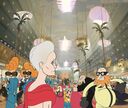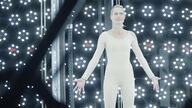1. From commodity consumption to image consumption
Popular words and new words can always reflect the characteristics of the times to a certain extent. For example, the more commonly used words such as "Ancient Style", "Little Fresh" and "Royal" all describe the atmosphere created by certain commodities. They cannot explain the usage or value of these commodities, but lead to a different life. style. People's consumption in pursuit of this style of life is image consumption. Different from commodity consumption in the past, which focused on the use value of commodities, image consumption focuses on the change of image in the process of consumption. For example, buying a house to live in is a commodity consumption; and a house bought within the second ring road of Beijing is more important to consumers than the function of living, which may be the hint of this consumption behavior. information about status or financial resources.
When discussing commodity society, Marx stated that in capitalist society, production is not for use value but for exchange value, and the premise of commodity exchange is that everything can be measured by value (that is, human labor). The ability to produce commodities is transformed into the ability to exchange between objects, and the exchange relationship between people is replaced by an abstract commodity relationship. [1] The result of this elevated commodity status is called Commodity fetishism by Marx, and its further development is that commodities expand from the real world to the image realm, the use value declines, the image dominates, and the landscape society has since arrival.
2. The Redevelopment of Landscape Society
Spectacle society refers to the replacement of real life by an image, "everything that exists immediately is transformed into an image."[2] Furthermore, "spectacle society means control and resignation, separation and loneliness"[3], because most people Watching wholeheartedly without participating in the creation, and losing communication with each other in silent watching. The film "Futurology Conference" makes interesting speculations about the future consumption in the spectacle society. The protagonist Robin is a film actor who was in his prime when he was young but is now out of breath. Forced to make a living, he had to sign an agreement with the film company to sell his character image and quit the showbiz, and the company can process this image through the computer to make it without actors. acting movie. According to the follow-up content of the movie, it can be inferred that in the following two decades, the company adjusted Robin's image to the peak of his era, and "shot" many movies that were loved by audiences. The image of Robin in his youth is owned by the company and the audience forever. Consumers who like Robins can consume as many young Robins as they want.
Twenty years later, Robin renews his contract with the company, further selling his image. In the animated city of Abel La Homer, the company uses new technology to create a chemical reagent that consumers can become a fixed character in a short time after taking it, and Robin becomes one of these characters. . The company held a futurology conference to gather various movie fans, that is, potential consumers, to announce the upcoming consumption patterns. At the conference site, the host stood on the high platform and looked down at the crowd, and someone beside him was beating drums to add to the fun. Every sentence the host said was short and provocative, with drums and cheers, like the master of the same religion; the crowd looked up at the high platform attentively, showing obsessive or ecstatic eyes, and responded with loud cheers from time to time, like a fanatical believer . Such a situation echoes the commodity fetishism explained by Marx, in which the public devalues itself in consumption, and the status of commodities (that is, the image at this time) is elevated. At the same time, the desire of consumers has also changed from having an image to occupying an image. Although it is somewhat exaggerated, it is a reasonable inference for the development of the commodity society.
Later, there are more and more choices that people can consume in movies, everyone can be what he wants to be, and all kinds of images can be seen on the road, Confucius, Buddha, Michael Jackson, Tom Cruise... The male protagonist Dylan even once became Zeus and completed the allusions of incarnating a bull to seduce the girl Europa and creating the Taurus. Everyone's wishes can be realized, and it seems that this society is full of freedom and harmony. However, as Dylan said when introducing the world to Robin, "There is no ego anymore, no competition, no violence, no war, no strengths and no secrets... when we consume our new personalities (personality), we emit pheromones in the air to let others form the image we want to present in their minds.”[4] As Guy Debord said, in contemporary capitalist society , "The landscape is the dominant mode in which people connect with each other from beginning to end" [5], the interaction of people in the film is based on the recognition and affirmation of the images of both sides, and the true self behind the images is unknown and no longer meaningful. When Robin learned that her daughter had also entered this animated world and wanted to find her, she realized that she would not be able to find her daughter behind these masked figures. After completely possessing these images, people finally fully manifest themselves as the image, and gradually give up the ego. When the ego dissipates, the inner emptiness of masks[6] becomes the property of these people, they consist of a mask, and "behind the mask there is nothing but another mask. There is no initial point waiting to be repeated by the mask[7], only the endless repetition of the mask itself."[8] The society of the spectacle thus develops to its extreme.
3. Advantages and Disadvantages of Landscape Social Development
In the vision of the extreme development of the landscape society, people live in a relaxed, non-competitive, leisurely and free society. According to Dylan's introduction, this is an anarchic society, and various cultural forms have been developed in multiple ways - after all, everyone can become any role in any cultural background. When everyone's desires are satisfied and the identity cannot be fixed, the existence of the state apparatus also loses its meaning. From the perspective of social harmony, such development results are indeed desirable.
The biggest problem, however, is the disappearance of the ego. The id, ego, and superego are the components of the personality. The id is the basis of the personality structure and follows the pleasure principle; the ego, as the executor of the personality, is connected to the reality, and the reality principle blocks the pleasure principle and restricts the id . When the ego disappears, the id cannot be restrained and pursues pleasure without moral consideration, thus explaining why the situationalists criticize the society of the spectacle - which unwittingly leads critical and creative people to deviate The direction of thought and action makes people stop thinking about how to change the environment around them, but turn to entertainment. The anarchism in the film also hints at the most quintessential depoliticization of the society of the spectacle: non-interventionism.
On the other hand, the disappearance of the self creates new possibilities for the definition of identity. Identity relies on the other to understand itself, and thus the other is an important being that determines subjectivity. When a person can be anyone, the boundary between the self and the other is broken, the distinction between the two becomes blurred or even disappears, so there is no longer the situation of the other disturbing the self, and the main anxiety is overcome from the root. production. People in the spectacle society in the film feel happy, not only because of the realization of freedom and desire, but also because the subject who has lost self-contemplation no longer has negative emotions arising from interpersonal relationships. This seems to be exactly Michel de Certeau's imagination of the creative consumption of consumers - to actively create artistic life in the consumer society through usage consumption and creative consumption. Just as Robin chose Usher's syndrome when she first consumed her image-altering drug, she flew through the sky with "spider-foot-like deformed skeletons of fingers and toes," rather than studying it, as doctors guessed. condition of a disease.
When this kind of creative consumption is available, according to De Seto's idea, the next step should be to build a community of connections between people, and then open up the possibility of democracy in a consumer society. However, the generation of relationships between people requires relatively stable communication, and political democracy requires people with rational thinking ability. Neither of these two points can be achieved in the context of self-disappearance, and the emphasis on creativity will lose its original value. significance. And the extent of this creative retention is also worth considering. Robin's ability to consume creatively is probably because he has just entered this society and has retained himself, so he can think and decide rationally. If the pursuit of desire satisfaction becomes the sole task of life, without rational morality and other factors that would contradict the principle of pleasure, what is the difference between being a human being and a machine that executes fixed instructions? Looking back at Marx's discussion on commodity fetishism, the relationship between people in the commodity society is "alienated" as a commodity relationship, while in the spectacle society, there is a new development - "alienated" into the relationship between landscapes. "To get rid of this alienation, we can only create new collectivity (collectivity)"[9], that is, to establish the connection between the self and the self under the phenomenon through communication, and find the connection of common points. Therefore, only by preserving subjectivity and self-preservation can it be possible to open up the space for communication and escape from the spectacle society that deprives human beings of their uniqueness.
4. Summary
The spectacle prophecy in the "Futurology Conference" is based on the development in the spiritual world, and there are many exaggerations, but the "excess" of this artistic technique ironically expresses the future development of the spectacle society reasonably. On the one hand, it affirms the happiness brought about by self-disappearance, and on the other hand, when reproducing this happiness, it depicts the person who is addicted to it as a thing, and presents this "authority's fascination" to bystanders. Now we are in the middle stage of the development of the landscape society - the stage of having an image and occupying an image. Occasionally I hear the news that ordinary people have plastic surgery to become stars, and I am surprised that the stage of showing images is getting closer and closer. At present, the lessons of the car are in front of you. Paying attention to your own subjectivity, preserving yourself, and establishing connections and exchanges outside the image of others are the way out to avoid repeating the same mistakes.
View more about The Congress reviews











